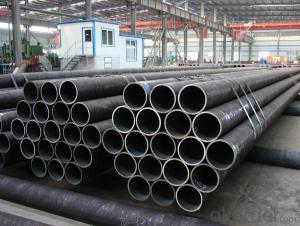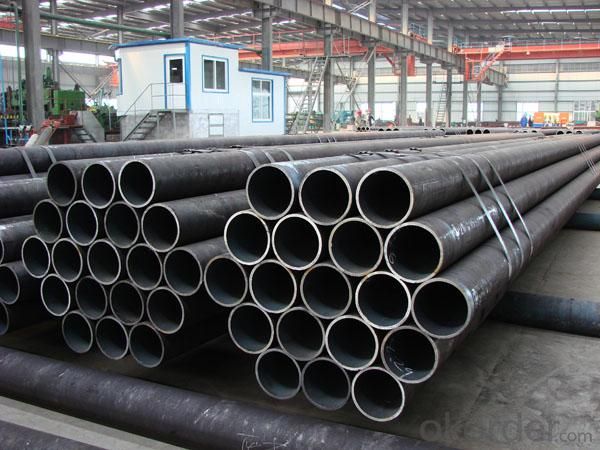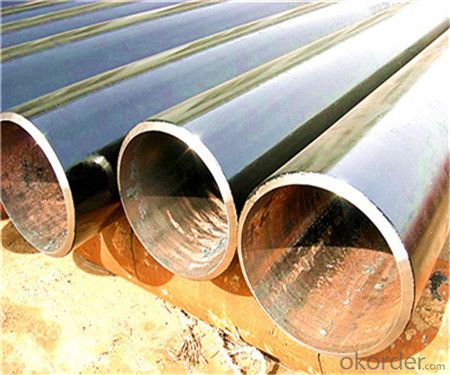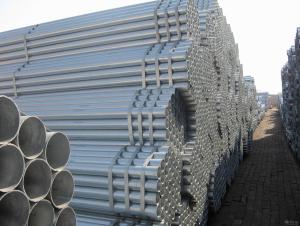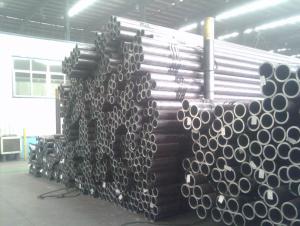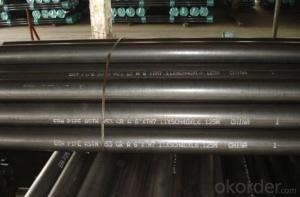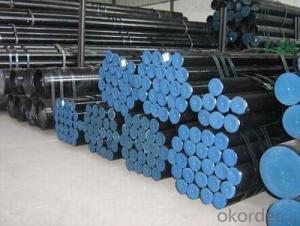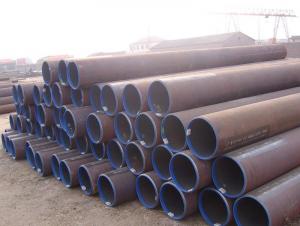BS 1387, GB/T 3091-2001, ASTM A53-2007 API 5L Welded Steel Pipe
- Loading Port:
- Tianjin
- Payment Terms:
- TT or LC
- Min Order Qty:
- 20 m.t.
- Supply Capability:
- 15000 m.t./month
OKorder Service Pledge
OKorder Financial Service
You Might Also Like
1、Structure of BS 1387, GB/T 3091-2001, ASTM A53-2007 API 5L Welded Steel Pipe:
ERW steel pipe is electric resistance welding, the abbreviation for ERW for transporting oil and natural gas vapor liquid objects, can meet the requirements of high and low pressure, the transport in the world with pipe sector accounted for a pivotal position.
2、Main Features of BS 1387, GB/T 3091-2001, ASTM A53-2007 API 5L Welded Steel Pipe:
• High manufacturing accuracy
• High strength
• Good visual effect
• Reasonable price
• Small inertia resistance
• Strong heat dissipation ability
3、BS 1387, GB/T 3091-2001, ASTM A53-2007 API 5L Welded Steel Pipe Specification:
Standard | GB, DIN, ASTM ASTM A106-2006, ASTM A53-2007 |
Grade | 10#-45#, 16Mn 10#, 20#, 45#, 16Mn |
Thickness | 1 - 33 mm |
Section Shape | Round |
Outer Diameter | 21 - 610mm |
Place of Origin | Tianjin, China (Mainland) |
Secondary Or Not | Non-secondary |
Application | Hydraulic Pipe |
Technique | Cold Drawn |
Certification | API |
Surface Treatment | factory state or painted black |
Special Pipe | API Pipe |
Alloy Or Not | Non-alloy |
Length | 5-12M |
Outer Diameter | 21.3-610mm |
Grade | 20#, 45#, Q345, API J55, API K55, API L80, API N80, API P110, A53B |
Standard | ASME, ASTM |
1) Material:20#(ASTM A 106/A53 GRB.API5LGRB,GB),45#,16Mn,10#.
2) Specification range:OD:21.3-610mm,WT:6-70mm,length:6-12m or according to the requirement of clients.
3) Excutive standards:GB,ASME API5L.ASTM A 106/A53,Despite of the above standards,we can also supply seamless steel pipe with standard of DIN,JIS,and so on,and also develop new products according to the requirements of our clients!
4) Surface:black lacquered,varnish coating or galvanized.
5) Ends:Beveled or square cut,plastic capped,painted.
6) Packing:bundles wrapped with strong steel strip,seaworthy packing.
4、Packaging & Delivery
Packaging Details: | seaworthy package,bundles wrapped with strong steel strip |
Delivery Detail: | 15-30days after received 30%TT |
5、FAQ of BS 1387, GB/T 3091-2001, ASTM A53-2007 API 5L Welded Steel Pipe:
①How is the quality of your products?
Our products are manufactured strictly according to national and internaional standard, and we take a test
on every pipe before delivered out. If you want see our quality certifications and all kinds of testing report, please just ask us for it.
Guaranteed: If products’ quality don’t accord to discription as we give or the promise before you place order, we promise 100% refund.
②How about price?
Yes, we are factory and be able to give you lowest price below market one, and we have a policy that “ for saving time and absolutely honest business attitude, we quote as lowest as possible for any customer, and discount can be given according to quantity”,if you like bargain and factory price is not low enough as you think, just don’t waste your time.Please trust the quotation we would give you, it is professional one.
③Why should you chose us?
Chose happens because of quality, then price, We can give you both.Additionally, we can also offer professional products inquiry, products knowledge train(for agents), smooth goods delivery, exellent customer solution proposals.Our service formula: good quality+good price+good service=customer’s trust
SGS test is available, customer inspection before shipping is welcome, third party inspection is no problem.
6.Images
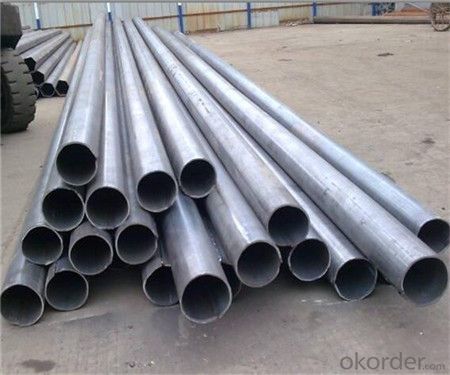
- Q: What is the outer diameter and wall thickness of the welded steel pipe of national standard DN250?
- DN250 is the nominal diameter, the outer diameter of the steel pipe is 273mm, the thickness is above 6.5mm.
- Q: Can steel pipes be used for transporting liquids?
- Yes, steel pipes can be used for transporting liquids. Steel pipes offer excellent strength, durability, and resistance to corrosion, making them suitable for various applications, including the transportation of liquids such as water, oil, and gas.
- Q: What is the difference between seamless steel pipes and seamless stainless steel pipes?
- The main difference between seamless steel pipes and seamless stainless steel pipes lies in their composition. Seamless steel pipes are made from carbon steel, while seamless stainless steel pipes are made from an alloy of stainless steel, which contains chromium and nickel. This alloy gives stainless steel pipes their unique properties such as corrosion resistance, durability, and a shiny appearance. Additionally, stainless steel pipes are often used in applications where hygiene and sanitation are crucial, such as in the food and pharmaceutical industries.
- Q: Are steel pipes more expensive than other types of pipes?
- The cost of steel pipes compared to other types of pipes can vary depending on various factors. Steel pipes are generally considered to be more expensive than some other types of pipes in terms of upfront cost. This is mainly due to the high cost of raw materials and the manufacturing process involved in producing steel pipes. Additionally, steel pipes are known for their durability and strength, making them a popular choice for applications where high pressure or extreme conditions are involved. However, when considering the long-term cost and benefits, steel pipes can often be more cost-effective. They have a longer lifespan compared to some other types of pipes, reducing the need for frequent repairs or replacements. Steel pipes also offer excellent resistance to corrosion, making them suitable for various environments and reducing maintenance costs over time. Moreover, the strength and durability of steel pipes can contribute to a lower risk of leaks or other failures, which can result in significant cost savings in terms of preventing damage or loss. It is important to consider the specific requirements and characteristics of the project or application when comparing the cost of steel pipes to other types of pipes. Factors such as the type of fluid or material being transported, the required pressure rating, the expected lifespan, and the environmental conditions should all be taken into account. Ultimately, while steel pipes may have a higher upfront cost, their long-term durability and reliability can often make them a cost-effective choice in many applications.
- Q: Are steel pipes suitable for use in pharmaceutical industries?
- Yes, steel pipes are suitable for use in pharmaceutical industries. Steel pipes are known for their durability, strength, and resistance to corrosion, making them ideal for transporting various pharmaceutical materials and fluids safely and hygienically. Additionally, steel pipes can withstand high pressure and temperature conditions, ensuring the integrity and efficiency of pharmaceutical manufacturing processes.
- Q: What is the difference between hot-dip galvanizing and electroplating of steel pipes?
- Hot-dip galvanizing and electroplating are two different methods of applying a protective coating to steel pipes. Hot-dip galvanizing involves immersing the steel pipes in a bath of molten zinc, which creates a thick, durable coating that provides excellent corrosion protection. On the other hand, electroplating involves passing an electric current through a solution containing zinc ions, which causes the zinc to bond to the surface of the steel pipes. While electroplating can provide a thinner coating, it is generally less durable and may require additional layers or coatings for sufficient corrosion resistance.
- Q: How do you calculate the pipe pressure loss coefficient for steel pipes?
- To determine the pressure loss coefficient for steel pipes, one can utilize the widely accepted Darcy-Weisbach equation. This equation calculates the pressure loss in pipes caused by friction. It can be represented as follows: ΔP = f × (L/D) × (V^2/2g) In this equation: - ΔP represents the pressure loss in units of pressure, such as psi or Pa. - f denotes the Darcy friction factor, a dimensionless value. - L signifies the pipe length in units of length, such as feet or meters. - D represents the pipe diameter in units of length, such as feet or meters. - V indicates the fluid velocity flowing through the pipe in units of velocity, such as ft/s or m/s. - g represents the acceleration due to gravity in units of acceleration, such as ft/s² or m/s². The Darcy friction factor (f) is a dimensionless parameter that quantifies the amount of frictional resistance in the pipe. For steel pipes, this factor can be determined using the Moody diagram. The Moody diagram presents a graphical relationship between the Reynolds number (Re) and the friction factor (f) for various pipe roughness values. To calculate the pressure loss coefficient, one should find the friction factor (f) value based on the Reynolds number (Re) and the relative roughness of the steel pipe (ε/D). The Reynolds number is calculated as follows: Re = (ρ × V × D) / μ In this equation: - ρ represents the fluid density in units of mass per unit volume, such as lb/ft³ or kg/m³. - V denotes the fluid velocity in units of velocity, such as ft/s or m/s. - D signifies the pipe diameter in units of length, such as feet or meters. - μ represents the dynamic viscosity of the fluid in units of force per unit area per unit time, such as lb/ft·s or kg/m·s. Once the Reynolds number (Re) and the relative roughness (ε/D) are determined, one can refer to the Moody diagram to find the corresponding friction factor (f). The pressure loss coefficient (K) can then be calculated using the following formula: K = f × (L/D) In this equation: - L represents the pipe length in units of length, such as feet or meters. - D denotes the pipe diameter in units of length, such as feet or meters. By utilizing the Darcy-Weisbach equation and the Moody diagram, one can accurately calculate the pressure loss coefficient for steel pipes. This calculation is crucial for the design and analysis of fluid flow systems.
- Q: What is the role of steel pipes in the chemical manufacturing industry?
- Steel pipes play a crucial role in the chemical manufacturing industry as they are widely used for transporting various chemicals, gases, and liquids. These pipes are highly durable, resistant to corrosion, and can withstand high temperatures and pressures, making them ideal for handling hazardous substances. Additionally, steel pipes ensure the integrity and safety of the chemical manufacturing process by preventing leaks, contamination, and loss of product.
- Q: What are the different international standards for steel pipes?
- There are several different international standards for steel pipes, including the American Society for Testing and Materials (ASTM), the International Organization for Standardization (ISO), and the European Committee for Standardization (CEN). These standards define specific requirements for the manufacturing, testing, and dimensions of steel pipes to ensure their quality and compatibility for various applications.
- Q: How are steel pipes repaired if they develop leaks?
- Steel pipes can be repaired if they develop leaks through various methods such as welding, clamping, or using epoxy compounds. The specific repair technique depends on the size and location of the leak as well as the type of pipe, and it is typically carried out by trained professionals with the necessary equipment and expertise.
Send your message to us
BS 1387, GB/T 3091-2001, ASTM A53-2007 API 5L Welded Steel Pipe
- Loading Port:
- Tianjin
- Payment Terms:
- TT or LC
- Min Order Qty:
- 20 m.t.
- Supply Capability:
- 15000 m.t./month
OKorder Service Pledge
OKorder Financial Service
Similar products
Hot products
Hot Searches
Related keywords
